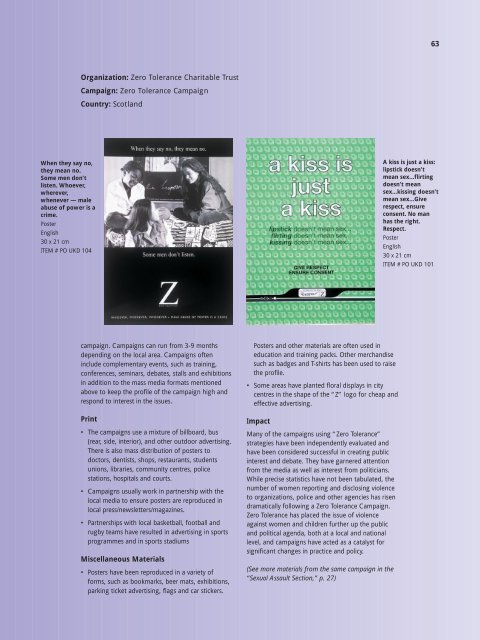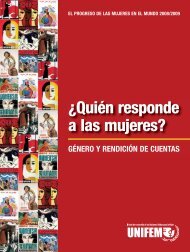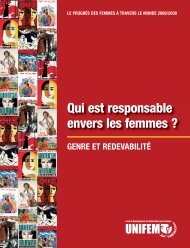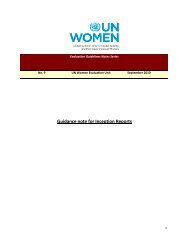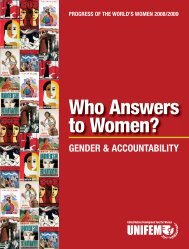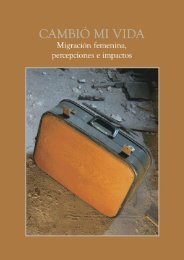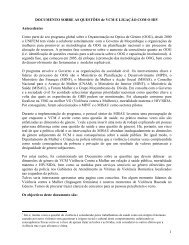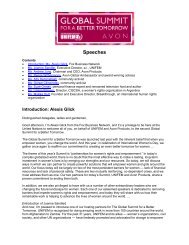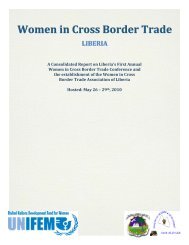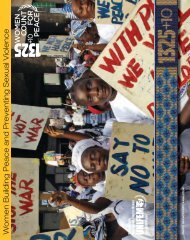You also want an ePaper? Increase the reach of your titles
YUMPU automatically turns print PDFs into web optimized ePapers that Google loves.
When they say no,<br />
they mean no.<br />
Some men don’t<br />
listen. Whoever,<br />
wherever,<br />
whenever — male<br />
abuse of power is a<br />
crime.<br />
Poster<br />
English<br />
30 x 21 cm<br />
ITEM # PO UKD 104<br />
Organization: Zero Tolerance Charitable Trust<br />
Campaign: Zero Tolerance Campaign<br />
Country: Scotland<br />
campaign. Campaigns can run from 3-9 months<br />
depending on the local area. Campaigns often<br />
include complementary events, such as training,<br />
conferences, seminars, debates, stalls and exhibitions<br />
in addition to the mass media formats mentioned<br />
above to keep the profile of the campaign high and<br />
respond to interest in the issues.<br />
Print<br />
• The campaigns use a mixture of billboard, bus<br />
(rear, side, interior), and other outdoor advertising.<br />
There is also mass distribution of posters to<br />
doctors, dentists, shops, restaurants, students<br />
unions, libraries, community centres, police<br />
stations, hospitals and courts.<br />
• Campaigns usually work in partnership with the<br />
local media to ensure posters are reproduced in<br />
local press/newsletters/magazines.<br />
• Partnerships with local basketball, football and<br />
rugby teams have resulted in advertising in sports<br />
programmes and in sports stadiums<br />
Miscellaneous Materials<br />
• Posters have been reproduced in a variety of<br />
forms, such as bookmarks, beer mats, exhibitions,<br />
parking ticket advertising, flags and car stickers.<br />
Posters and other materials are often used in<br />
education and training packs. Other merchandise<br />
such as badges and T-shirts has been used to raise<br />
the profile.<br />
• Some areas have planted floral displays in city<br />
centres in the shape of the “Z” logo for cheap and<br />
effective advertising.<br />
Impact<br />
Many of the campaigns using “Zero Tolerance”<br />
strategies have been independently evaluated and<br />
have been considered successful in creating public<br />
interest and debate. They have garnered attention<br />
from the media as well as interest from politicians.<br />
While precise statistics have not been tabulated, the<br />
number of women reporting and disclosing violence<br />
to organizations, police and other agencies has risen<br />
dramatically following a Zero Tolerance Campaign.<br />
Zero Tolerance has placed the issue of violence<br />
against women and children further up the public<br />
and political agenda, both at a local and national<br />
level, and campaigns have acted as a catalyst for<br />
significant changes in practice and policy.<br />
(See more materials from the same campaign in the<br />
“Sexual Assault Section,” p. 27)<br />
63<br />
A kiss is just a kiss:<br />
lipstick doesn’t<br />
mean sex...flirting<br />
doesn’t mean<br />
sex...kissing doesn’t<br />
mean sex...Give<br />
respect, ensure<br />
consent. No man<br />
has the right.<br />
Respect.<br />
Poster<br />
English<br />
30 x 21 cm<br />
ITEM # PO UKD 101
64<br />
Alto a la violencia. [Stop violence.]<br />
Poster<br />
Spanish<br />
Milenio Feminista<br />
61 x 90 cm<br />
ITEM # PO LAC 34<br />
NIGERIA<br />
<strong>Violence</strong> against<br />
women. Stop this<br />
inhumanity to women.<br />
Poster<br />
1997, English<br />
<strong>Women</strong>, Law and<br />
Development Centre<br />
Nigeria<br />
62 x 44 cm<br />
Poster text reads: Say no<br />
to...childhood marriage,<br />
wife beating, sexual<br />
harassment, female child<br />
labour, rape, female<br />
circumcision, negative<br />
cultural attitude,<br />
violence from law<br />
enforcement agency,<br />
denial of female<br />
education, trafficking in<br />
women, degrading<br />
traditional practices,<br />
discrimination in<br />
employment<br />
ITEM # PO NGA 173<br />
PARAGUAY<br />
Sin violencia podemos mirar en<br />
positivo. Cada día miles de<br />
mujeres son víctimas de<br />
agresiones sexuales, psíquicas,<br />
físicas y emocionales en su propio<br />
hogar... [Without violence we can<br />
have a positive look. Each day<br />
thousands of women are victims<br />
of sexual, psychological, physical<br />
and emotional abuse in their own<br />
home....]<br />
Poster<br />
Spanish<br />
Paraguay Secretaría de<br />
la Mujer, Paraguay Plan<br />
Regional Piloto de<br />
Prevención y Atención<br />
a la Violencia<br />
Intrafamiliar contra la<br />
Mujer, Banco<br />
Interamericano de<br />
Desarrollo<br />
56 x 40 cm<br />
ITEM # PO PAR 21
PERU<br />
Confianza. Esta municipalidad<br />
apuesta por erradicar la violencia<br />
contra la mujer. [Trust. This<br />
municipality’s bet is to eradicate<br />
violence against women.]<br />
Poster<br />
Spanish<br />
Flora Tristán, Centro<br />
de la Mujer Peruana<br />
69 x 49 cm<br />
ITEM # PO PER 117<br />
Tienes Derecho a Una Vida Sin<br />
Violencia. [You have the right to a<br />
Life Without <strong>Violence</strong>.]<br />
Poster<br />
Spanish<br />
Peru<br />
Defensoria<br />
del Pueblo<br />
Defensoria<br />
Especializada<br />
en los<br />
Derechos de<br />
la Mujer<br />
82 x 60 cm<br />
ITEM # PO<br />
PER 107<br />
65
66<br />
Multi-Media Approaches to End <strong>Violence</strong><br />
Organization: Instituto Social y Politico de la Mujer (ISPM)<br />
Campaign: Mass Campaign to Educate Citizens<br />
on Preventing <strong>Violence</strong> against <strong>Women</strong><br />
Country: Argentina<br />
La desvalorización verbal es una forma de violencia contra<br />
la mujer. Pedí ayuda, no esperes a que sea tarde. [Verbal<br />
abuse is a form of violence against women. Ask for help,<br />
don’t wait until it is too late.]<br />
Background<br />
Poster<br />
1998, Spanish<br />
Instituto Social y Político de la Mujer<br />
60 x 42 cm<br />
ITEM # PO ARG 22<br />
Algunas mujeres no dan la cara. Hay cosas<br />
que no se pueden ocultar. La violencia es<br />
una de ellas. Denúnciela. [Some women<br />
don’t show their face. There are things you<br />
cannot hide. <strong>Violence</strong> is one of them.<br />
Report it.]<br />
Poster<br />
1998, Spanish<br />
Instituto Social y Político de la Mujer<br />
60 x 42 cm<br />
ITEM # PO ARG 2<br />
Instituto Social y Politico de la Mujer (ISPM) aims to<br />
create public consciousness about the problem of<br />
violence against women. During the first phase of<br />
their awareness-raising campaign — which focused<br />
on raising awareness about domestic violence and<br />
sexual abuse — more than 600 journalists and<br />
broadcast reporters were enlisted to strategically<br />
cover issues of violence against women and promote<br />
them as a priority on the national political agenda.<br />
Campaign posters were created by students of the<br />
Communication and Design School of Buenos Aires<br />
University. Student designers worked in consultation<br />
with ISPM to design a series of powerful ads dealing<br />
with issues of violence against women. ISPM thus<br />
gained the services of a group of talented young<br />
artists, sensitizing them to issues of gender violence<br />
in Argentinean society, while the students gained<br />
experience and exposure for their work. The yearlong<br />
phase two of the campaign involved extensive<br />
use of press materials and publicity events such as a<br />
mass postcard mailing to parliamentarians urging<br />
them to support reform of the sexual crimes criminal<br />
code. The target audience for these media materials<br />
included politicians, reporters, journalists, women’s<br />
NGOs, gender experts and the general population.<br />
Campaign Materials<br />
Posters/Print<br />
A variety of striking posters created by the graphic<br />
design students were viewed by over 20,000 people
Los de afuera no son de palo. La violencia contra la mujer<br />
es un problema de la sociedad. Tu indiferencia te convierte<br />
en cómplice. [It’s NOT none of your business. <strong>Violence</strong><br />
against women is society’s problem. Your indifference<br />
makes you an accomplice.]<br />
at the Recoleta Cultural Centre in Buenos Aires, as<br />
well as in other cultural centers around the country<br />
and abroad. ISPM displayed these posters on public<br />
billboards and transportation in a systematic way in<br />
the year 2000, with the aid of a well-known<br />
Argentinean advertising agency. The posters are<br />
available online on the ISPM website<br />
(www.ispm.org.ar/violencia) which receives up to<br />
12,000 visitors per month, 43% of whom view the<br />
section on violence against women.<br />
Broadcast<br />
Poster<br />
1998, Spanish<br />
Instituto Social y Político de la Mujer<br />
60 x 42 cm<br />
ITEM # PO ARG 23<br />
During the campaign in 1998, ISPM produced 4<br />
television programmes on domestic violence, sexual<br />
harassment, rape and prostitution. These were<br />
broadcast for half an hour, three times a week, on<br />
ARGENTINA<br />
Ver que hay violencia hacia la mujer. No cierres los<br />
ojos... [See the violence against women. Don’t<br />
close your eyes]<br />
Poster<br />
1998, Spanish<br />
Instituto Social y Político de la Mujer<br />
60 x 42 cm<br />
ITEM # PO ARG 7<br />
Golpear marca, insultar marca, patear marca, humillar marca.<br />
Denunciar marca el cambio. La violencia contra la mujer es<br />
responsabilidad de todos...denúnciela. [Beating marks,<br />
insulting marks, kicking marks, humiliating marks. Reporting<br />
marks a change: violence against women is everyone’s<br />
responsibility. Report it]<br />
Poster<br />
1998, Spanish<br />
Instituto Social y Político de la Mujer<br />
60 x 42 cm<br />
ITEM # PO ARG 10<br />
cable stations that reach approximately 15 million<br />
viewers in Latin America.<br />
Stories about the organization have been broadcast<br />
on various cable TV stations and ISPM has also been<br />
profiled on commercial radio and on Radio América<br />
AM, reaching Argentina and neighbouring countries.<br />
Impact<br />
Significant changes to sex crime legislation in<br />
Argentina took place shortly after the ISPM<br />
campaign. ISPM campaign materials have been<br />
widely replicated and are being used by other NGOs<br />
in the region, such as the Latin American Network<br />
against Domestic and Sexual <strong>Violence</strong>. Furthermore,<br />
between 1998 and 2000 ISPM was able to mobilize<br />
more than half a million dollars for its campaigns.<br />
67
68<br />
SOUTH AFRICA<br />
Abusive speech is a deadly<br />
weapon. Name calling, mocking,<br />
accusing, swearing, lying, put<br />
downs, intimidation, death<br />
threats and racial or religious slurs<br />
are all acts of abuse and will kill a<br />
relationship.<br />
Sticker<br />
English<br />
NISAA Institute for <strong>Women</strong>’s<br />
Development<br />
5 x 25 cm<br />
ITEM # TD SOA 27<br />
You can’t beat a woman.<br />
Sticker<br />
English<br />
NISAA Institute for <strong>Women</strong>’s<br />
Development<br />
5 x 25 cm<br />
ITEM # TD SOA 29<br />
SWEDEN<br />
De värsta ärren sitter<br />
på insidan. Våld mot<br />
kvinnor är ett brott.<br />
Bekämp a det! [The<br />
worst scars are on the<br />
inside. <strong>Violence</strong><br />
against women is a<br />
crime. Fight it!]<br />
Poster<br />
Swedish<br />
Operation Kvinnofrid<br />
70 x 50 cm<br />
ITEM # PO SWE 60<br />
SWITZERLAND<br />
<strong>Violence</strong> against women is a<br />
public health problem. It can be<br />
prevented.<br />
Poster<br />
English<br />
World Health Organization<br />
42 x 59 cm<br />
ITEM # PO SWI 228
16 Days of Activism against <strong>Gen</strong>der<br />
<strong>Violence</strong>: Global Campaign for <strong>Women</strong>’s<br />
Human Rights<br />
Background<br />
This annual campaign, taking place from 25 November<br />
to 10 December, has been used as an organizing<br />
strategy by individuals and groups from around the<br />
world to call for the elimination of all forms of violence<br />
against women. Growing out of the Center’s first<br />
<strong>Women</strong>’s Global Leadership Institute in 1991, the<br />
campaign links violence against women and human<br />
rights, emphasizing that all forms of violence, whether<br />
perpetrated in the public or private sphere, are a<br />
violation of human rights. The dates that participants<br />
chose for the campaign symbolically make this link: 25<br />
November marks the International Day for the<br />
Elimination of <strong>Violence</strong> Against <strong>Women</strong> and 10<br />
December is International Human Rights Day. The 16day<br />
period also highlights other significant dates<br />
including 1 December, World AIDS Day, and 6<br />
December, anniversary of the Montreal Massacre in<br />
which 14 Canadians were murdered by a gunman<br />
targeting only women.<br />
Campaign Materials<br />
In coordinating the campaign, the CWGL assists<br />
individuals and organizations in planning activities<br />
which focus on developing and calling for the<br />
implementation of local, national and global policies<br />
to eliminate violence against women. The Center<br />
sends names, fax numbers and e-mails of individuals<br />
and organizations coordinating 16 Days activities to<br />
Imagine a world where all women enjoy their human<br />
rights : Take action to make it happen/Imaginemos un<br />
mundo en el que todas las mujeres gocen plenamente<br />
de sus derechos humanos/Imaginons un monde où<br />
toutes les femmes jouissent pleinement de leurs droits<br />
humains.<br />
Poster<br />
1998, English, Spanish, French<br />
Center for <strong>Women</strong>’s Global Leadership<br />
71 x 51 cm<br />
ITEM # PO USA 1388<br />
Organization: Center for <strong>Women</strong>’s Global<br />
Leadership (CWGL)<br />
Campaign: 16 Days of Activism against<br />
<strong>Gen</strong>der <strong>Violence</strong><br />
Countries: Global<br />
enable campaign participants to exchange letters of<br />
solidarity and support and to work together in the<br />
future. The Center develops and publicizes the theme<br />
of the campaign in collaboration with activists from<br />
around the world. Resources available for the 16 Days<br />
Campaign include an international calendar of<br />
campaign activities, a "Take Action Kit," and an<br />
interactive website instrumental in promoting the<br />
campaign on a global scale.<br />
Impact<br />
More than 800 organizations in over 90 countries<br />
have participated in the 16 Days Campaign since its<br />
launch in 1991. Many of the campaigns listed in this<br />
catalogue were conceived as part of the 16 Days of<br />
Activism. Because the campaign has grown into a<br />
global movement, precise statistics and indicators<br />
cannot adequately express its impact. However, on the<br />
global scale, these campaigns have succeeded in:<br />
raising awareness about gender-based violence as a<br />
human rights issue at the local, national, regional and<br />
international levels; strengthening local work around<br />
violence against women; making a clear link between<br />
local and international activism; creating a method to<br />
share and develop new and effective strategies;<br />
demonstrating the solidarity of women around the<br />
world organizing against violence against women; and<br />
creating tools to pressure governments to implement<br />
promises made to eliminate violence against women.<br />
69


